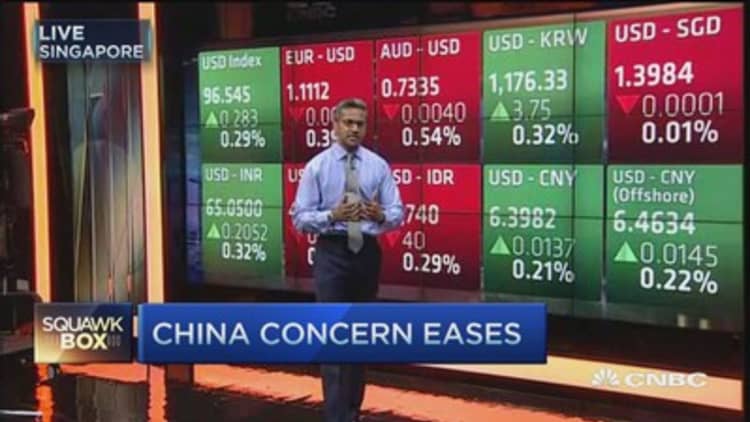


China has allowed its currency to depreciate by about 4.4 percent since Tuesday, on hopes of boosting the domestic economy. But there may end up being serious negative consequences for the Chinese corporate sector.
Many Chinese companies will face new challenges in an environment where currency appreciation is no longer a given, experts told CNBC. Those include difficulties with outstanding debts—especially those denominated in U.S. dollars—but also for dashed assumptions about future borrowing opportunities.
"Since 2005, there's this implicit assumption on the part of corporate CFOs in China that the renminbi is a one-way ride, that it's going to appreciate relative to the dollar," said Teresa Kong, portfolio manager at Matthews Asia, an Asia-only investment firm with about $30 billion under management. "That has caused a moral hazard, this idea that the cost of capital is a lot lower than what it really is."
Dollar-denominated borrowing has been on the rise in the Chinese corporate sector, said Patrick Chovanec, managing director and chief strategist at Silvercrest Asset Management. Those companies with dollar debt will now find it more costly to service their obligations, and that could create repercussions across the country's economy, experts said.
Read More Why did China devalue the yuan? 3 charts explain
Debt is "obviously a big issue," Wells Fargo Funds Chief Portfolio Strategist Brian Jacobsen told CNBC, explaining that small companies with weak balance sheets will get squeezed the hardest. Banks, he added, have been extending credit to those firms, so the entire financial sector may feel some repercussions, which could "create a cascade of problems."
Varied figures exist on how much dollar-denominated debt Chinese companies are holding. Nomura estimated in a Thursday note that total Chinese external liabilities amount to roughly $1.135 trillion—comprising approximately $729 billion in international bank loans and about $405 billion in bond issuance—although it is difficult to know the denomination breakdown of these obligations.
The sectors that could be in trouble
The data is "sketchy" on the amount of Chinese corporate debt, or which companies or sectors hold it, Jacobsen said. But market movements indicate that information technology, real estate development, and the financial sector are the most heavily exposed, he added.
Some companies have even taken on dollar debt despite working with global commodities (which are largely priced in the U.S. currency), effectively "doubling down" on their risk for yuan depreciation, Kong explained. That includes large manufacturers that buy metals on the international markets, she said.
Read MoreChina hedge funds lose $10 billion after market collapse
All of those sectors are major players in the Chinese economy, but any upcoming currency difficulties do not pose a systemic risk, said Nicholas Lardy, a China expert and senior fellow at the Peterson Institute for International Economics. Some companies may fail after getting squeezed on the yuan depreciation, but stronger players will take their place, he explained.

Additionally, the Nomura note highlighted that China's reserves cover its external liabilities by more than three times, although that would not help individual firms to meet their obligations.
Beyond the debt service issue, companies now run the risk of their current financial plans becoming untenable as the dollar-yuan "carry trade" unwinds, Chovanec said.
"Even if [those companies] don't lose that much, the carry trade unravels and you have to exit investments," he said. "The Chinese government is not going to let you exit large positions, and so you might not be liquid; complications emerge."
It's not just financial companies that would be put at risk by a disintegrating carry trade: A growing portion of Chinese corporate profits come from "non-core" activities—property or financial investments—so firms in disparate sectors could face challenges from the yuan depreciation.
All of those factors will create a "change of mindset" for Chinese companies, said Charlie Awdry, Chinese equity fund manager at Henderson Global Investors.
In fact, most Chinese CFOs have "never really" looked at currency mismatches in their asset liabilities, Kong told CNBC.
"Maybe this is a little bit of a wake-up call for the companies that currency isn't a one-way bet," Jacobson said.


